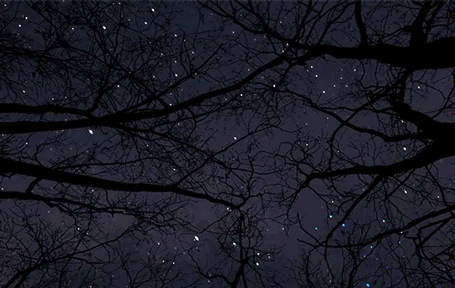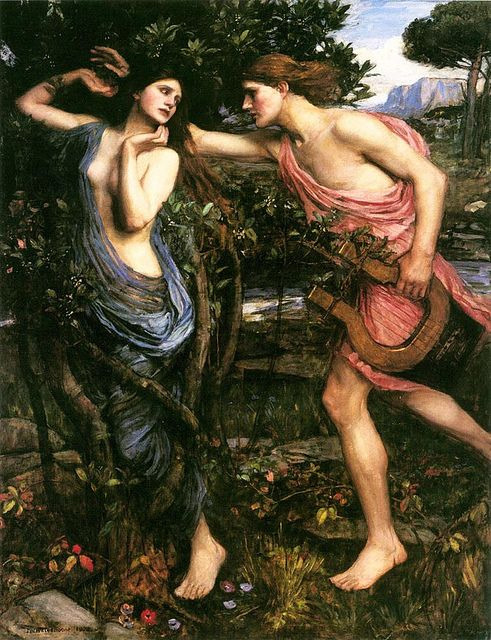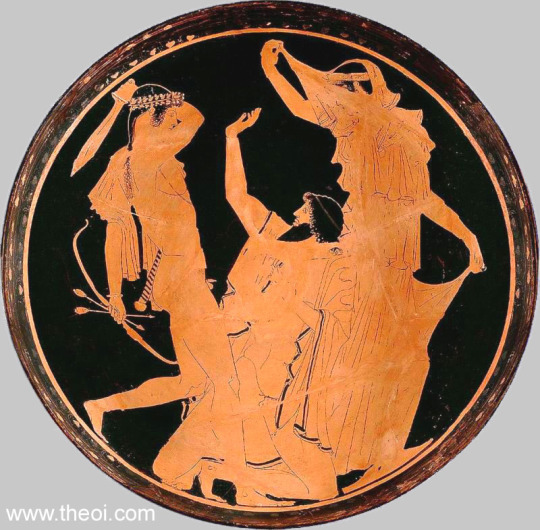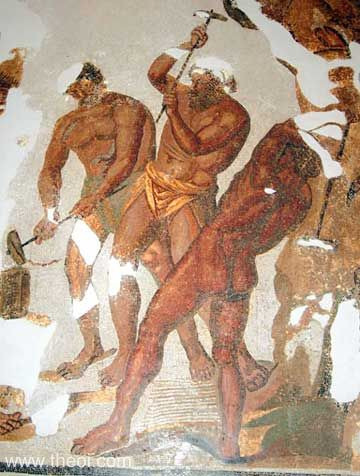#terpsikhore deity
Explore tagged Tumblr posts
Note
You, I made this post, somewhere, anyway, what are 10 minor deities u know of. This is just for fun 😎
Khaire!
Your wording at the start kind of confuses me, sorry. ^^; But I'll gladly talk about some minor deities I know of!
Triton, a god of the Sea, is one that I was paid to make a subtle worship post on and will be doing one for soon here. Galatea, goddess of calm seas, is another I paid to make a post about! Hippocrates, the god of Silence, was one I hadn't heard of before someone requested I make a post about him; his history is pretty interesting! There's also Thanatos, god of Peaceful Death, who is often confused with and overshadowed by Haides, interestingly. Asclepius, god of Medicine, is a son of Apollo who was actually deified after being killed for discovering a way for humans to not die (seems the gods aren't big on immortality for humans in the myths, and I don't blame them XD). Nyx, goddess of the Night, is pretty lesser known as well but is said to be one of the most powerful goddesses within the myths - someone who even Zeus himself feared the power of. Tyche, goddess of Fortune, is another deity who gets often overlooked but is known to control both good and bad fortune, among many other things. Harmonia, goddess of Harmony, is a daughter of Ares and Aphrodite, actually, who was transformed into a snake along with her lover. Morpheus, the leader of the Oneiroi and God of dreams, is a pretty interesting figure who is a son of Hypnos. And last, but not least, is Iris, messenger of Hera and goddess of Rainbows, who is very often overlooked in modern worship circles, unfortunately.
An honorable mention goes to all of The Muses, who are lesser known than they should be, for sure. Clio (Muse of History), Calliope (Muse of Epic Poetry & Eloquence), Melpomene (Muse of Tragedy), Thalia (Muse of Comedy), Erato (Muse of Erotic Poetry), Polyhymnia (Muse of Religious Hymns), Ourania (Muse of Astronomy), Euterpe (Muse of Lyric Poetry), and Terpsikhore (Muse of Choral Song and Dancing).
Hope this gives you a good answer! Take care! 🧡
34 notes
·
View notes
Text
Welcome to Memories of the Muses

Hello and welcome to Memories Of the Muses, a multi-person devotional blog to the nine clear-voiced Muses, but we still include the Mousai Apollonides and Mousai Titanides. Here we seek to bring worship and glory to the muses, bring attention to writers in their work, and promote poetry and art no matter how “good” or “bad” it is.
Submissions of poetry, art, hymns to the theoi and heroes, etc will be allowed but you must follow the guidelines. Absolutely no bigotry or else you will be blocked on site.
This post will also be serving as a masterpost for all muse educational posts and worship ideas. This will be divided into categories depending upon the author. A known epithet of said mod will be included for Kalliope reasons.
Lastly, please read the Welcome and About page for more information. Thank you for reading and have a lovely day.
Educational Posts
[ Posts by Adrian Of nature-eyed Dionysus ]
[ Posts by light-bringing Riva ]
Devotional Posts
Devotionals
Prayers and Hymns
Submission Guidelines
Thank you for wanting to submit to the blog. You will have to follow these guidelines if you expect your submission to be accepted.
Absolutely no bigotry, antisemitism, white supremacy, etc. Your submission will be deleted and you will be blocked and reported.
Do not attack other gods / heroes in your submission.
No graphic descriptions of sex or sexual content.
No submissions that promote self-harm or other destructive behaviours.
While submissions of non hellenic gods are allowed, your submission must invoke the muses or feature a hellenic god.
Your submission must be a form of writing, music, poetry, dance, astronomy, history, etc. Essentially anything that falls within the realm of the mousai.
If it is a history, analysis of comedy/tragedy, astronomical writings, etc please cite your sources and create a bibliography. You can generate an easy bibliography using this site.
Absolutely no plagiarism.
Thank you for reading and we welcome you to the memories of the muses. May your inspiraby endless.
Updated as of 22 December 2020
#muses deities#mousai deities#calliope deity#kalliope deity#calliopeia deity#kalliopeia deity#calliope worship#calliopeia worship#kalliope worship#kalliopeia worship#erato deity#erato worship#ourania worship#ourania deity#thalia deity#thalia worship#euterpe deity#euterpe worship#terpsichore deity#terpsikhore deity#terpsikhore worship#terpsichore worship#polymnia deity#polyhymnia deity#polymnia worship#polyhymnia worship#kleio deity#kleio worship#clio deity#clio worship
14 notes
·
View notes
Photo


K-pop aesthetics; greek deity 》Chunga ⇢ Terpsichore
Terpsichore was one of the nine muses, the goddesses of music, song and dance. In the classical era, when the Mousai were assigned specific literary and artistic spheres, Terpsikhore was named Muse of choral song and dancing, and depicted with a lyre and plectrum. Her name means "Delighting in Dance" from the Greek words terpsis "to delight" and khoros "dance".
#greek mythology#greek deity#nine muses#terpsichore#music#dancing#song#Aesthetic#kpop#k-pop#aesthetics#chungha#kim chungha#idol#female idol#female artist#female solo
12 notes
·
View notes
Text
Day 6 of 30 Days of Apollon
Other related deities and entities associated with this deity
Part of Apollon’s retinue is ‘The Muses’
THE MOUSAI (Muses) were the goddesses of music, song and dance, and the source of inspiration to poets. They were also goddesses of knowledge, who remembered all things that had come to pass. Later the Mousai were assigned specific artistic spheres: Kalliope (Calliope), epic poetry; Kleio (Clio), history; Ourania (Urania), astronomy; Thaleia (Thalia), comedy; Melpomene, tragedy; Polymnia (Polyhymnia), religious hymns; Erato, erotic poetry; Euterpe, lyric poetry; and Terpsikhore (Terpsichore), choral song and dance.
In ancient Greek vase painting the Mousai were depicted as beautiful young women with a variety of musical intruments. In later art each of the nine was assigned her own distinctive attribute.
There were two alternative sets of Mousai--the three or four Mousai Titanides and the three Mousai Apollonides.

aly-naith.tumblr.com
The Muses were sisters and daughters of Apollon, as part of his retinue they inspired mortals to create.
Other some but not all related deities are below:
Daphne
DAPHNE was a Naiad-nymph of the river Ladon of Arkadia or the Peneios (Peneus) in Thessalia. She was loved by the god Apollon who pursued her until she grew exhausted and cried out to Gaia (Gaea) for help. The goddess transformed into a laurel tree which Apollon then adopted as his sacred plant.
In a festival at Delphoi (Delphi), a branch of a sacred laurel tree was brought to the shrine from the Thessalian vale of Tempe. This rite would suggest that the Thessalian version of the Daphne myth was the oldest.
The Delphians also had a closely related myth about a certain Daphnis who they describe as the Oreiad-nymph prophetess of Gaia at the shrine before Apollon assumed control.

Tityos
TITYOS (Tityus) was an Euboian or Phokian giant who assaulted the goddess Leto as she travelling to the shrine of Delphoi (Delphi). Her son Apollon quickly intervened and slew the giant with a volley of arrows and the blade of his golden sword. As further punishment for his crime, Tityos was staked to the ground in the underworld where two vultures were set to feed on his ever-regenerating liver.
Tityos' name is probably derived from the Greek word tisis meaning "he who suffers retribution." Alternatively he might be connected with the Tityroi, the flute-playing satyrs of Boiotian lore.

Cyclopes
THE ELDER KYKLOPES (Cyclopes) were three, orb-eyed, immortal giants who forged the lightning-bolts of Zeus. As soon as they were born, their father Ouranos (Uranus, the Sky) locked them away inside the belly of Earth, along with their stormy brothers, the hundred-handed Hekatonkheires (Hecatoncheires). When the Titanes overthrew Ouranos, they drove the giants into the pit of Tartaros. Zeus and his brothers later released them and in return they provided the god with his thunderbolts, Poseidon with his storm-raising trident, and Haides with a helm of invisibility.
Some say there were a total of seven forging Kyklopes. The lesser four, sons of the first, were slain by Apollon to avenge the death of his son Asklepios (Asclepius), who had been slain by Zeus with a Kyklops-forged lightning-bolt.
The tribe of younger Kyklopes which Odysseus encountered on his travels were a different breed.

#30 days of Apollon#dodekatheism#hellenic polytheism#hellenismos#hellenic pagan#for the love of apollo#for the love of the dodekatheon#ares is great#Hail King Zeus and Queen Hera#hermes is my god#Hades is great too#Hestia is a sweetheart#30 days of deity devotion#30 days of devotion
8 notes
·
View notes